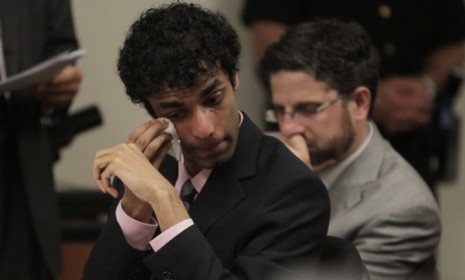Tyler Clementi case: Is Dharun Ravi's jail sentence too lenient?
After being convicted of a "bias crime" for spying on his gay roommate Clementi, who committed suicide in 2010, Ravi is sentenced to only 30 days in prison

In 2010, gay Rutgers student Tyler Clementi committed suicide by leaping off the George Washington Bridge after learning that fellow student Dharun Ravi had used a webcam to record him kissing another man. The case thrust the bullying epidemic and the suicide trend among gay teens into the national spotlight. Now, Ravi, convicted in March of "bias intimidation and invasion of privacy," has been sentenced to 30 days in jail, far less than the maximum of 10 years. The judge ruled that, while he believes Ravi acted out of "colossal insensitivity," he does not believe that "he hated Tyler Clementi." In addition to 30 days in jail, Ravi must pay more than $11,000 in restitution and will serve three years of probation. Is the punishment fair?
It's too lenient: We have opposed the maximum sentence for Ravi, says Steven Goldstein, chair of New Jersey-based LGBT advocacy organization Garden State Equality in a statement. But we also opposed the opposite extreme: No jail time at all, which is what this 30-day sentence essentially amounts to. While Ravi wasn't perhaps directly responsible for Clementi's suicide, his actions and words did "broadcast anti-gay animus to Tyler Clementi and the world." This was not "merely a childhood prank gone awry." And Ravi hasn't done enough to atone for it.
The Week
Escape your echo chamber. Get the facts behind the news, plus analysis from multiple perspectives.

Sign up for The Week's Free Newsletters
From our morning news briefing to a weekly Good News Newsletter, get the best of The Week delivered directly to your inbox.
From our morning news briefing to a weekly Good News Newsletter, get the best of The Week delivered directly to your inbox.
It's the right sentence: A "perfect storm" of factors led to Ravi's vilification throughout his trial, says Christine Flowers at the Philadelphia Daily News: At the same time that Americans were growing exasperated with the increasing intrusiveness of technology, gay suicides were newly prominent, and the anti-bullying movement was gaining steam. These factors led some to assume wrongly that Ravi catalyzed Clementi's suicide, as if he was "standing behind Clementi on that bridge, and either whispered in his ear, or pushed him off." Ravi could easily have been a "sacrificial lamb to those 'social causes.'" Thankfully, cooler judicial heads prevailed.
"Something that looks like justice"
Maybe now he will apologize: Throughout this whole ordeal, Ravi has never said, "I'm sorry," says Mary Elizabeth Williams at Salon. The judge even pointedly told Ravi during sentencing: "I haven't heard you apologize once." Perhaps, with this lenient punishment, Ravi and "others who have so cavalierly shamed and exploited people" will learn the value of mercy. A judge can't impose a sentence of atonement, but this — if Ravi finally acknowledges that he's done wrong — might have the same effect.
"It's time for Dharun Ravi to apologize"
A free daily email with the biggest news stories of the day – and the best features from TheWeek.com
-
 Syria’s Kurds: abandoned by their US ally
Syria’s Kurds: abandoned by their US allyTalking Point Ahmed al-Sharaa’s lightning offensive against Syrian Kurdistan belies his promise to respect the country’s ethnic minorities
-
 The ‘mad king’: has Trump finally lost it?
The ‘mad king’: has Trump finally lost it?Talking Point Rambling speeches, wind turbine obsession, and an ‘unhinged’ letter to Norway’s prime minister have caused concern whether the rest of his term is ‘sustainable’
-
 5 highly hypocritical cartoons about the Second Amendment
5 highly hypocritical cartoons about the Second AmendmentCartoons Artists take on Kyle Rittenhouse, the blame game, and more